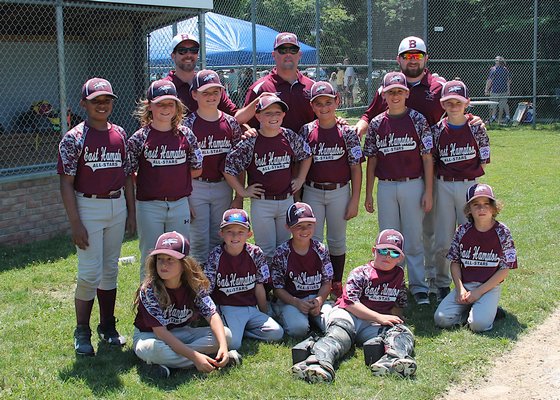
When Andrew McLain stepped into the dusty, cobweb-coated attic of the East Hampton Historical Society’s Clinton Academy, he said he felt like a child on Christmas morning, standing among relics dating back hundreds of years.
“I love seeing these treasures,” said Mr. McLain, a woodworker and history buff who lives in Southampton. “I don’t know if I’m just missing a gene or have an extra gene, but I just gravitate toward this stuff.”
On Friday, April 15, Mr. McLain and his wife, Colette Gilbert, will aspire to instill that same sense of wonder during an interactive talk, “What’s This For? Farm and Household Tools to Stump Your Imagination,” which they will hold at 7 p.m. at the Clinton Academy Museum in East Hampton. It is the concluding lecture of a four-part winter series, which began in January, exploring the society’s collections.
Ms. Gilbert said she and her husband are equally excited about the collection and the talk.
“For Andrew, seeing that attic, it was like watching all of the characters coming to life from your favorite fairy tale,” Ms. Gilbert said. “We’re going to have a great time with this. And I hope it’s not just our great time.”
The couple—which Ms. Gilbert characterized as a “Hepburn-and-Tracy” dynamic duo—will present about 20 obscure-looking tools and gadgets that were typically used in 18th- and 19th-century households. During the presentation, they will reenact a husband-and-wife team of the time, even down to dressing the parts.
The presentation is meant to fully engage the audience, according to Richard Barons, the East Hampton Historical Society’s executive director.
“We’ll ask the audience what the tools are for and then really stump him,” said Mr. Barons with a chuckle. “That’s exactly what we’re going to do.”
Mr. McLain and Ms. Gilbert were tight-lipped about the rustic objects, but Mr. Barons let a couple of secrets slip during a telephone interview last week.
He described one tool—a pie lifter dating back to 1900—as a “crazy-looking wire thing.”
“It has these little things on it that will, in fact, hold a hot pie tin to pull it out of a coal stove in lieu of hot mats,” Mr. Barons said. “You’d never know what it was. It’s just a very odd-looking contraption.”
Equally fascinating is a tool that aided blacksmiths when they made screws, he reported.
“This is probably from around 1750—and now that is a really weird-looking thing,” he said, adding, “It’s indescribable.”
The tools will be restored to their original exhibits or placed back in storage after their one night of glory, Mr. Barons said.
Ms. Gilbert said that she and her husband hope to amp up the excitement during their interactive talk.
“We’ll be interacting with the audience and having fun with the tools, or maybe throwing them at each other, which I would get great satisfaction from,” said Ms. Gilbert, laughing. “After 15 years in a relationship, throwing tools could be a good thing.”
The historic interpreter, who has been doing reenactments for about 25 years, said that when Mr. Barons approached her and her husband, she was thrilled.
“I’ve had this almost deliciously evil desire to get my hands on every one of his collections,” Ms. Gilbert said.
The tools will unravel a picture of the early East End settlers, who are traditionally viewed purely as austere and puritanical, Ms. Gilbert said. She said that she seeks to set the record straight.
“When you read about their daily lives, it gives us an insight of a slice of the early American pie that life was truly like,” she said. “There was love, intrigue. There was bad behavior and there was joy, bickering and pettiness. There’s all this stuff that we deal with today, but because cultures were so very new then, it was a wonderful way of seeing how we develop. People don’t change.”
Highlighting business transactions and romantic interludes between settlers and the Montaukett Native American tribe on the East End, Ms. Gilbert said the tools talk will serve as a window into a different era.
“There are all of these delicious tidbits, and if Andrew and I can bring a little bit of it to life, people will come away with the sense that there are wonderful, wonderful stories about amazing lives that basically have been lost to history,” she said. “By examining the tools that they made and the tools that they used, maybe we can come away with a greater respect and understand these characters.”
Mr. McLain, who has 36 years of reenacting under his belt, said he hopes the audience walks away with more than just a history lesson.
“It will be great if the audience reflects on these tools, and maybe, they can even help them get over some little problem that they have in their modern life,” he said. “Like, ‘Gee, if somebody could make that, then I can do this.’ I draw on that all the time.”
The East Hampton Historical Society will continue its free Winter Lecture Series with “What’s This For? Farm and Household Tools to Stump Your Imagination,” on Friday, April 15, at 7 p.m. at the Clinton Academy Museum in East Hampton. For more information, call 324-6850, email info@easthamptonhistory.org or visit easthamptonhistory.org.